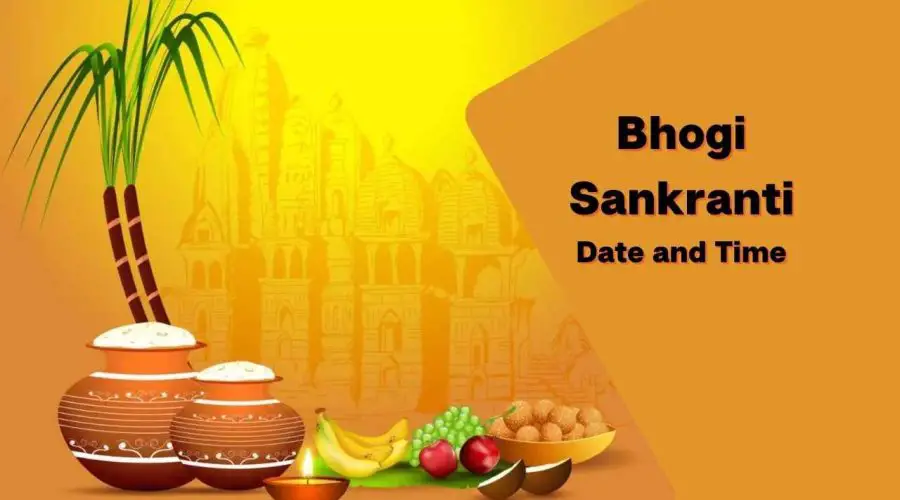All You Need to Know About Bhogi 2024: Dates and Rituals in Andhra/Telangana
In Andhra Pradesh and Telangana, Bhogi or Bogi is the first day of Sankranti celebrations.
The date is set for January 14, 2024, in the TTD panchangam and the State Government calendar.
Bhogi is celebrated on the same day in both Telugu and Tamil cultures. The main activity on the day is the burning of everything nasty or useless – a type of purification ceremony.
Please note that Bhogi is observed on January 13 in Tamil Nadu and Maharashtra.
The Meaning of Bhogi
- Goddess Godha Devi was the avatar of Mother Earth, Bhoodevi is a great devotee of Vishnu
- Goddess Godha Devi was found in Periyalwar’s garden. She grew up to be a Vishnu follower and a mystic poet. Thiruppavai was written by her.
- Goddess Godha Devi reached beatitude and became the consort of Lord Ranganatha (Bhagavan Vishnu) at Srirangam as a result of her ardent and unshakable devotion to Bhagavan Vishnu.
- Goddess Goda Devi is a great exponent of Bhakti Marga. She is a prominent model of bridal mysticism – moksha through consort, similar to Bhakti Bhava for Vishnu.
- Goda Devi is said to have reached nirvana when she joined Sri Ranganatha on Bhogi day. Thus, Bhogi is the day on which Goda Devi reached Bhoga Aikya (Merger of Eternal Happiness).
The Ritual of Bhogi Muggulu and Bhogi Pallu
The drawing of Bhogi Muggulu (a form of Rangoli) and Bhogi pallu functions is an important ritual on the day.
Young children are showered with regi-pallu, flower petals, sugarcane bits, money, and jaggery at Bhogi Pallu celebrations. Children are subjected to Aarti. Women bless them by singing songs.
The marriage of Goda Devi is celebrated in Tirupati Venkateswara Temple and other Vishnu Temples on the day of Bhogi, which is the last day of Dhanurmasam. It is widely assumed that those who witness this holy marriage will marry soon. Witnessing Goda Devi’s holy marriage with Sri Ranganatha helps in having a peaceful and joyful married life. Therefore many couples participate in the marriage of Goda Devi.
Bhogi is celebrated in Tamil Nadu on the last day of the month of Margali. It is observed in the Pushya month in Andhra Pradesh and Telangana.
Symbolic Meaning of Lighting of Bhogi Fire
The lighting of the fire on Bhogi represents the burning away of bad habits and the subsequent living of a virtuous life. People build a campfire using wood logs, other solid fuels, and old wooden furniture before sunrise. Unused articles are tossed into the sacrificial fire as a sign of giving up old habits, vices, attachments, and material possessions.
Frequently Asked Questions
1. Why do we celebrate Bhogi festival?
Spiritually, the Bhogi festival is held in honour of Lord Indira, the rain goddess, in order to obtain her blessings for plentiful rains that will aid farmers in harvesting their crops. The farmers also offer prayers for wealth and success.
2. What should we do on Bhogi festival?
The family’s female members make rounds around the sacred fire while chanting mantra and singing songs of adoration to the gods. On this day, after taking a holy dip, women dress new and accessorise. Following Bhogi, there is a ceremony called Pongal Panai, in which fresh earthen pots are painted and embellished with flowers and mango leaves.
3. Why do we burn things on Bhogi?
During Bhogi back then, agricultural waste and wood were burned to provide heat for the farmers during the coldest part of winter (marghazhi). But as time has gone on, individuals have started to burn undesirable stuff like furniture, clothes, plastics, tyres, and tubes, which pollutes the air.
4. Who celebrates Bhogi?
Hyderabad: Bhogi is the first day of the four-day Pongal festival known as Makar Sankranti. The southern states of Telangana, Andhra Pradesh, Tamil Nadu, and Karnataka are where it is primarily noticed.

